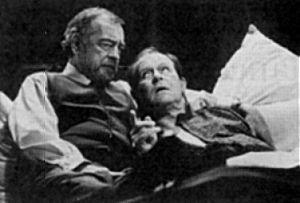|
Gabriel is visibly dying but, although confined
to his bed, he sports a Japanese kimono, toupee and full make-up, and treats
his last exit as another histrionic performance. With camp hilarity he
announces: "Dying is really like being stuck in a traffic jam in Limerick." He
eagerly quizzes his nurse Alma about her tragic family history. And he rails
constantly at his lifelong partner for his professional shortcomings ("You
couldn't direct my cock out of a paperbag") and for having betrayed him through
loving him.
On one level, the play resembles a
high-spirited Irish version of Ronald Harwood's The Dresser. Like Harwood's
play it celebrates a vanished age of outsize performance and enjoys a complex
relationship with fact. Just as Harwood's "Sir" was inspired by Wolfit but
ultimately transcended him, so Gabriel is based on MacLiammoir but becomes an
epitome of a florid theatrical gaiety that disappeared with the
Coward-Novello-Gielgud era. Asked by his nurse if he ever went to bed with a
woman, Gabriel announces with the hauteur of Lady Bracknell: "In my day it was
never done."
But McGuinness is not simply writing a paean to
the past. He is also exploring the symbiotic link between gayness and theatre.
At one point, Conrad recalls that the pioneering youthful dream of himself and
Gabriel was that "we shall conceive a child in Sodom". That is exactly what
MacLiammoir and Edwards did. The oldest Dublin theatre joke is that, with the
Gate devoted to a gay fin-de-siècle aesthetic and the Abbey to rural
Irish naturalism, the city's two playhouses ofered a choice between "Sodom and
Begorrah". But theatre itself, McGuinness implies, becomes for gay men and
women a surrogate form of procreation: the only tragedy lies in the medium's
inherent impermanence.
Clearly McGuinness is fascinated by the idea of
inheritance, both artistic and emotional. But, in exploring what we mean by it,
he introduces too many unresolved plot strands. Still, he has come up with one
of his best plays, a moving meditation on the transcience of love, life and
theatre - and a declaration that the "rigmarole" is still worth it.
He has also written a real actors' piece and
gets two star performances. Alan Howard brilliantly satirises the heroic style
of which he was a notable latterday exponent. Cushioned in splendour, he lends
the most mundane remark a Shakespearean resonance. Even more crucially, he
conveys Gabriel's capacity for self-mockery. "No one," he cries, turning down
an impossible request, "would attempt to climb the Matterhorn in high-heels,"
before adding with a twinkle, "except possibly me." Yet beneath Howard's
rhetorical bravura, you sense a genuine fear of death.
He is excellently partnered by Richard Johnson
as Conrad, who conveys quiet, enduring love in the teeth of endless,
exasperating provocation. It is heartening to see McGuinness returning to the
form of Observe the Sons of Ulster. This is a fine play not just about Irish
theatre's profound debt to two queer Englishmen but about the urge to defeat
death by leaving our fingerprints on posterity.
Michael Billington.
The Guardian, 4.5.02. |
